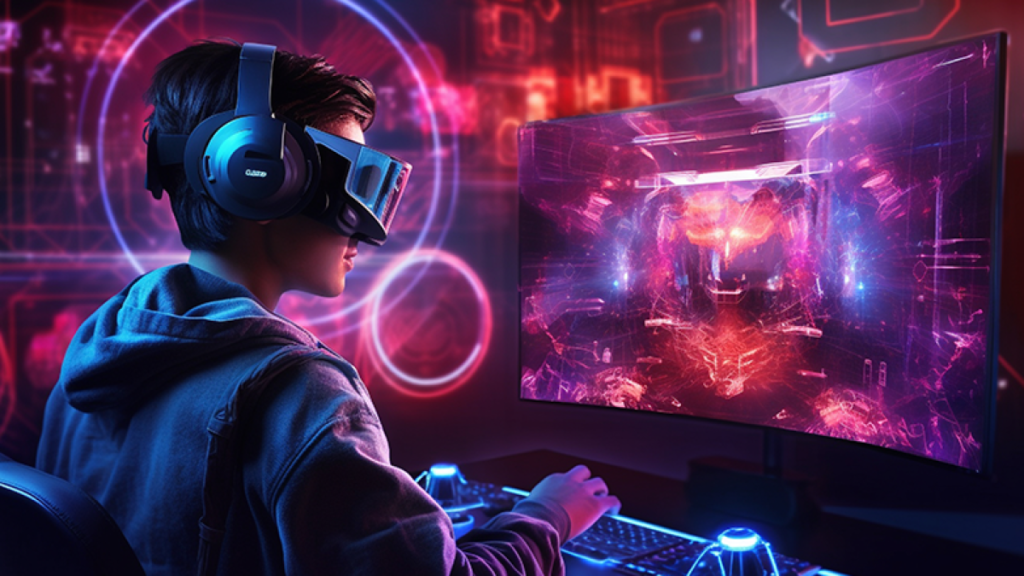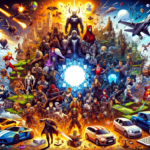The world of gaming has evolved significantly over the past few decades, transforming from simple pixelated screens to immersive, hyper-realistic experiences. What was once considered a niche hobby has now become a massive global industry, with gaming being one of the most popular forms of entertainment worldwide. From console games to mobile apps and virtual reality (VR) worlds, the gaming landscape is constantly expanding and pushing the boundaries of technology, creativity, and storytelling. But what does the future hold for gaming? In this article, we explore how gaming is shaping the future of entertainment and what to expect in the years to come.
A Glimpse into the Past: How Gaming Has Evolved
The history of video games is a story of innovation. In the 1970s, gaming was confined to arcades with simple games like Pong and Space Invaders. The 1980s and 1990s saw the rise of home consoles like the Atari, Nintendo, and Sega, and with it came iconic franchises like Super Mario, The Legend of Zelda, and Sonic the Hedgehog. As technology advanced, so did the complexity of games, with more sophisticated graphics, deeper storylines, and expansive worlds.
The 2000s brought the online multiplayer era, with games like World of Warcraft, Call of Duty, and Fortnite connecting players from all corners of the globe. Today, gaming is not only about play but about shared experiences, global communities, and an interconnected digital world.
The Rise of Cloud Gaming
One of the most exciting trends in the future of gaming is the rise of cloud gaming. Services like Google Stadia, NVIDIA GeForce Now, and Xbox Cloud Gaming (formerly Project xCloud) allow players to stream games directly to their devices without the need for powerful hardware. With cloud gaming, players can access high-quality gaming experiences on their smartphones, tablets, or even low-end laptops, bypassing the need for expensive gaming PCs or consoles.
This shift is opening up gaming to a wider audience, making it more accessible and flexible. Players no longer need to invest in costly hardware upgrades; they can simply pay for a subscription and stream the latest titles as long as they have a stable internet connection. The potential for cloud gaming to reshape the industry is enormous, particularly as internet infrastructure continues to improve worldwide.
Virtual and Augmented Reality: Entering New Worlds
While cloud gaming is revolutionizing how we access games, virtual reality (VR) and augmented reality (AR) are transforming the very nature of how we play. VR gaming immerses players in fully digital environments, allowing them to interact with 3D worlds in ways that were previously unimaginable. Titles like Beat Saber, Half-Life: Alyx, and The Walking Dead: Saints & Sinners have shown that VR can deliver experiences that go far beyond traditional gaming.
The future of VR holds endless possibilities. As technology improves, VR headsets are becoming lighter, more comfortable, and more affordable, with more immersive graphics and reduced motion sickness. This opens the door for deeper, more engaging experiences, from interactive storytelling to full-body simulations.
Augmented reality (AR), on the other hand, overlays digital elements onto the real world. Pokémon Go was a pioneer in AR gaming, encouraging players to explore the world around them to catch virtual creatures. As AR technology continues to advance, we can expect even more sophisticated games that blend the digital and physical worlds seamlessly, creating experiences that feel more like living in a video game than playing one.
AI and Procedural Generation: Personalized Gaming Experiences
Artificial Intelligence (AI) is another key player in the future of gaming. AI can enhance gameplay by making non-player characters (NPCs) more intelligent, enabling them to react dynamically to the player’s actions and decisions. In open-world games like The Witcher 3 or Red Dead Redemption 2, AI is already used to create realistic NPC behavior, but we can expect it to get much more advanced in the future, with AI-driven characters who remember players’ choices and adapt to their playstyle.
In addition, procedural generation—the use of algorithms to create vast, unique environments on the fly—allows for endless possibilities. Games like Minecraft, No Man’s Sky, and Hades use procedural generation to create dynamic, ever-changing worlds. The future of gaming will likely feature more procedurally generated content, offering players unlimited variation in everything from terrain to quests and characters.
With AI, we can also expect more personalized gaming experiences, where games learn from your actions and adjust the gameplay to suit your preferences and skill level. Whether it’s adjusting the difficulty of a level, suggesting new games based on your play history, or offering custom-tailored storylines, AI will make every player’s journey unique.
Esports and Competitive Gaming: The New Frontier
Esports, the organized, multiplayer video game competitions, has exploded in popularity over the past decade. Games like League of Legends, Dota 2, and Fortnite have turned professional gaming into a global spectacle, with millions of viewers watching tournaments online and in arenas. The esports industry has become a multibillion-dollar enterprise, with sponsorships, prize money, and career opportunities for professional gamers and streamers.
As esports continues to grow, we can expect even more immersive, large-scale competitions. The future of esports may include virtual stadiums, where players and fans can meet in VR environments, or even new gaming genres designed specifically for competitive play. Furthermore, with platforms like Twitch, YouTube Gaming, and Facebook Gaming, streaming and content creation will continue to be an integral part of the gaming experience, enabling gamers to share their experiences, strategies, and personalities with the world.
The Future of Storytelling in Gaming
The future of gaming is not just about technology—it’s also about storytelling. As games become more sophisticated, the lines between video games, movies, and interactive media continue to blur. Games like The Last of Us and Red Dead Redemption 2 have set new standards for storytelling in games, combining cinematic narratives with player-driven choices. In the future, we can expect even deeper narratives, with characters who evolve based on player decisions and worlds that react dynamically to player actions.
Moreover, with advancements in AI and VR, we may see the rise of truly interactive stories, where players can influence every aspect of the plot, characters, and setting. Imagine a game where the world and the story unfold based on how you interact with the environment, your decisions, and your relationships with other characters, creating a completely unique narrative every time you play.
Conclusion: A World of Limitless Possibilities
The future of gaming is boundless. As technology continues to advance, games will become more immersive, accessible, and personalized, offering experiences that are richer, more dynamic, and more interactive than ever before. Whether through cloud gaming, virtual reality, AI-driven narratives, or competitive esports, the gaming industry is poised to lead the way in the future of entertainment.
As players, we are only beginning to scratch the surface of what gaming can offer. The next few decades will bring unimaginable innovations, transforming gaming into an even more integral part of our lives. The question isn’t whether gaming will change the future of entertainment—it’s how far we can go as technology unlocks new worlds for us to explore and experience. The future of gaming is not just a destination; it’s an exciting, ever-evolving journey.



